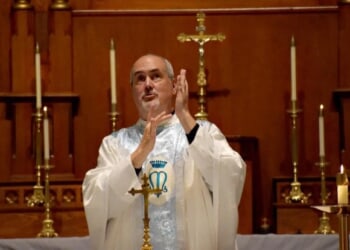Andrew Gilligan is a writer and former No10 adviser to Boris Johnson and Rishi Sunak
As soon as the Downing Street switchboard put me through, the newly-elected Tory MP started crying down the phone. “Please don’t sack me, please, please,” he sobbed. “It isn’t what they say it is – I can explain. Please, please don’t do this to me.” It was January 2020, it was one month after Boris Johnson’s general election triumph, and it was my first sign that Britain’s new blue army might not be quite the fighting force we expected.
I explained I was the transport adviser, not the chief whip. I’d only called as part of a general ring-round to find out his views on HS2, I’d used the switchboard because I didn’t have his number, and I had no idea what he was talking about. It turned out to be his commercial relationship with a sugar daddy website, about to be exposed by Buzzfeed. This same MP was later fined £2,500 for leaving the scene of an accident after he drove his Mercedes into a lamp-post while dressed in a PVC miniskirt and high heels.
One of the many things that needs to be fixed if the Conservatives are ever to recover is the recruiting and management of the parliamentary party.
The 2019-24 parliament saw ten Tory MPs lose the whip over allegations of sexual misconduct. Others were accused, among other things, of using political donations to pay off “bad people” who had locked them in a flat; of being willing to break lobbying rules for money; and of comparing the use of the Covid vaccine to the Holocaust.
Then there were the rampant egomaniacs, obsessed with the spotlight and publicly revelling in their ability to cause trouble for the party in whose name they had all been elected. Those imagining that their TV profiles would be noticed and rewarded by the voters were disabused on election day, when people saw only the brand they had helped destroy.
Unlike most other things the last government got wrong, this is within our power to change right now. We could start by recognising that the way we chose our candidates, and the way we treated them when they became MPs, is part of the reason so many went off the rails.
Lord Brady of Altrincham was chairman of the 1922 Committee for all but a few months of the Tories’ 14 years, the longest-serving holder of the post. “We started to deter people who might be good by treating the candidates’ list as a workforce,” he says. “It didn’t matter that you were a young parent, you were expected to travel the length of the country whenever there was a campaign. Sane people don’t do that. If you’re working very hard to get your business off the ground, it’s not necessarily a time when you want to go to the Glasgow Central byelection.”
Brady also thinks that changes to selection boards have been a “big mistake: it used to be two days, with an overnight. We had a dinner, and lots of drink would be taken, and it was a really good opportunity to see if people couldn’t hold their drink and didn’t know how to behave. Being an MP, so much of it is your ability to do the socialised stuff, speaking to people on doorsteps or at constituency dinners, dealing with colleagues, and we don’t really test that.”
Might there even be merit in some sort of “Tory Sandhurst” for candidates?
Far shorter than the real thing, say a week, and without the physical elements, but with the same broad objects: to instil an ethos, discipline and team spirit, to teach relevant professional skills such as how to engage on social media, and to weed out those who don’t make the grade. The Conservative Party did have a training college, latterly at Swinton, until the 1970s. And politics is a little bit like the army; you can survive only as a team, not as individuals, something that not enough recent Tory politicians seemed to realise.
If you do make it to the backbenches, it’s understandable why some become faintly deranged, or addicted to spectacle.
Life is often difficult, lonely and unsatisfying, and if your party is in government it certainly doesn’t feel like a team. You are held responsible for decisions in which you had no part, and though adjacent to power you are almost entirely excluded from it. Brady says that Tory prime ministers “do seem to start off from a position of distrust. It’s almost as if they see the parliamentary party as the enemy.”
Boris, he says, used to boast that he saw more MPs than any other PM, “but he never listened to us!”
In macro policy, it is important to listen, but also hard to satisfy everyone: they want different and conflicting things. But as a No10 spad I argued that each MP should be asked to nominate one local project that they wanted and could claim credit for. That would, of course, have to be a negotiation, not a blank cheque. I suggested, too, giving backbenchers a co-development role in tackling problems they knew and cared about – the hollowing out of villages by second homes for many Devon and Cornwall MPs, for instance – making them more involved and educating both sides: the civil servants, ministers and spads about the needs of communities, the backbenchers about the grind, complexities and tradeoffs of policy.
Both things nearly happened in 2022, but fell victim, like much else, to the collapse of the Johnson government.
We were terrible at keeping people informed: little was more infuriating for colleagues than learning about some government announcement affecting their patch from the media, or their Labour-controlled council. Pre-briefing was difficult because MPs would leak, in one case before the meeting (a Teams call) had even finished, but one-to-one briefings can reduce that risk. We had to work with councils and mayors, but we didn’t do enough to find a place for our own colleagues in the local decision making process.
In opposition, it should be a lot easier. The stakes are lower.
There is no reason why MPs should not be fully involved in the policy development process. The parliamentary party is so small, it should be possible for the leader and chief whip to get to know everyone in it, and to find a useful job for all who want one. And it is calmer: the cold douche of electoral disaster has washed away some of the worst maniacs, and quietened those who survived. MPs (and candidates) should be given more access to polling, to the latest campaign techniques, including internationally, and to a database of achievements, facts and statistics. And for those who get into trouble, the disciplinary process should be quicker and fairer: another complaint rightly made by colleagues, some of them innocent, left for months under a cloud.
The parliamentary party is the face of Conservatism. In future, let us ensure that it is not wrapped round a lamp-post, wearing a PVC miniskirt.







![‘We All Owe Him (Elon) a Huge Debt of Gratitude’ [WATCH]](https://www.right2024.com/wp-content/uploads/2025/03/‘We-All-Owe-Him-Elon-a-Huge-Debt-of-Gratitude-350x250.jpg)

![Trump's Admin Guts Another ‘Rogue Government Agency with Zero Accountability’ [WATCH]](https://www.right2024.com/wp-content/uploads/2025/03/Trumps-Admin-Guts-Another-‘Rogue-Government-Agency-with-Zero-Accountability-350x250.jpg)







